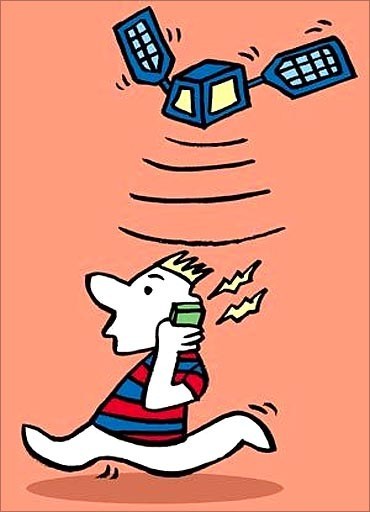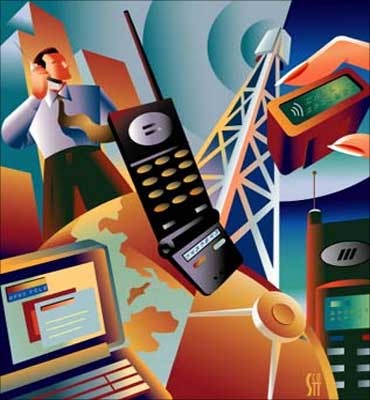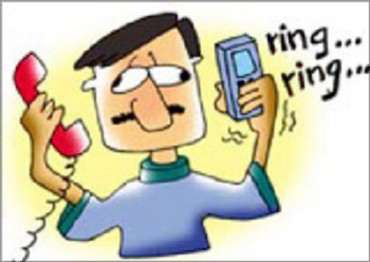Photographs: Uttam Ghosh/Rediff.com Meghana Biwalkar in Mumbai
How many times have you dropped something important to take a phone call only to find a telemarketer on the other side? Several times, right?
Well, the good news is that you can now finally bid goodbye to these pesky calls and SMSes, as the Telecom Regulatory Authority of India has issued the final deadline for the implementation of its directive against commercial calls. It's September 27, 2011.
Wasn't this supposed to happen in January, 2001? Yes, but, for now, the chances of this directive being a success seem quite high. Since the inception of the earlier Trai Regulation on Unsolicited Commercial Communications (UCC), unwanted pesky calls and SMSes have substantially decreased. Telecom majors, like Bharti Airtel, exited the bulk SMS business in July last year.
However, UCC SMS still remains an area of concern with other service providers.
This time round, Trai and the industry have worked together to implement a robust system that is designed to totally eliminate the problem of both voice and SMS UCC.
...
Pesky SMSes/calls: What YOU can do
The year gone by . . .
India has over 850 million mobile and over 34 million fixed-line phone subscribers. This number, thus, presents a mammoth task for the regulators and industry to implement the UCC solution.
Last year, the regulator had announced recommendations to curb the menace of such calls and SMSes, but the guidelines could not be implemented in the absence of an identified number series, first in case of commercial calls coming from mobile networks and then for landline phones.
Now, "DoT (Department of Telecom) has provided '140' number series to be allocated to telemarketers. Access Providers (operators) have to make relevant provisions in their network before allocation of resources to telemarketers using '140' numbering series from both mobile and fixed line networks," Trai said.
As India, the second largest telecom market in the world, has taken the lead in designing a system unique in the world that includes two databases -- a 'Do Not Call' and a 'Do Call' registry with 7 preference categories for customers who would like to receive only select calls and SMSes.
...
Pesky SMSes/calls: What YOU can do
In the past, this coupled with a "scrubbing" (by the telemarketer) and a "filtering" (by the originating service provider) requirement along with a new numbering prefix, this unique system posed a stringent set of challenges to service providers in implementation.
"We are happy to report that our engineers and programmers have completed the task in time for the September 27 rollout. Additional Trai regulations such as telemarketer registration, black listing of errant telemarketers, onerous penalties on both offending network operators and telemarketers, among other things, make this one of the most robust overall solutions proposed anywhere in the world," the Cellular Operators Association of India said in a statement.
Rajan S Mathews, director general, COAI, said, "We believe this is a comprehensive approach to the problem and is our best chance to stop this nuisance to our customers."
Mathews was, however, careful to set expectations saying, "While we expect a smooth rollout, any project of this magnitude and complexity (over 800 million connections, covering 22 circles and 12 operators), was bound to have a few hiccups. We hope these will be minor and customers will enjoy this new experience."
...
Pesky SMSes/calls: What YOU can do
What's the good word?
At present, Trai has identified seven categories under the National Do Not Call Registry -- banking and financial products, real estate, education, health, consumer goods, automobiles, communication and entertainment, tourism and leisure.
So, as a customer this is what you have to do to stop those errant callers/telemarketers and SMSes:
- You can register your number in NDNC registry by calling or sending SMS to toll-free number, 1909
- The SMS should content the text: 'START DND'.
- The registration will come into effect within 45 days from the date of registration.
...
Pesky SMSes/calls: What YOU can do
In case, in the future, if you change your mind and would like to receive marketing calls, all you have to do is:
- De-register your phone number from NDNC by calling or sending SMS to toll-free 1909
- Here, the SMS text should include 'STOP DND'. It will be removed from the National Do Not Call Registry within the next 45 days.
...
Pesky SMSes/calls: What YOU can do
But, you don't have to choose the absolute extremes. Subscribers have the option of choosing either the 'fully blocked' category, which is similar to the 'Do Not Call Registry' or one can go in for the 'partially blocked' category.
Under the partially blocked category, you will continue to receive SMSes only in the categories chosen by you.
For instance, if you want to receive messages related to banking/ insurance /financial products/credit cards, just send in a message to your service provide stating 'START 1'.
Likewise, 'START 2' for real estate, 'START 3' for education, 'START 4' for health, 'START 5' for consumer goods and automobiles, 'START 6' for communication/entertainment and 'START 7' for tourism/ leisure.
Further, you also have the option of opting multiple category preferences. Here, just send an SMS to 'START 1, 2, 3 and so on,' to 1909.
...
Pesky SMSes/calls: What YOU can do
Taking control . . .
Despite all these measures, if you still continue to receive pesky calls or SMSes, you can take the matter in your hands. Trai assures that the defaulter will be heavily fined.
Thus, if your number has been on the National Do Not Call Registry for at least 45 days and you receive a call from a telemarketer, you can file a complaint within 15 days from the receipt of UCC Calls/SMS with full details to your service provider.
The details must include the call originating number, date/time of the call and type of commercial message.
...
Pesky SMSes/calls: What YOU can do
Photographs: Reuters
The complainant should insist for the complaint number, which should be kept for further reference.
(a) On the issue of first notice by the Originating Access Provider to the telemarketer for sending any UCC, a sum of Rs 25,000 shall be deducted from the security deposit of the telemarketer and deposited in the account as may be specified by Trai, from time to time.
(b) On the issue of second notice, a sum of Rs 75,000 shall be deducted from the security deposit of the telemarketer.
c) On the issue of third notice a sum of Rs 80,000 shall be deducted from the security deposit of the telemarketer.
(d) On the issue of fourth notice, a sum of Rs 120,000 shall be deducted from the security deposit of the telemarketer.
e) On the issue of fifth notice a sum of Rs 150,000 shall be deducted from the security deposit of the telemarketer.
(f) On the issue of sixth notice a sum of Rs 250,000 shall be deducted from the security deposit of the telemarketer.
...
Pesky SMSes/calls: What YOU can do
Photographs: Daniele la Monaca/Reuters
The directive and its impact
So, as customers and industry wait for the final implementation of the directives, are telecom majors happy about this move?
Leading telecom players like Vodafone prefers to play safe by not commenting on an industry issue like this.
However, industry body COAI points out that "the directive does not impact or affect the service providers. Trai and the industry have worked together to implement a robust system that is designed to significantly reduce the problem of both voice and SMS UCC, which will benefit their subscribers."
In fact, COAI feels the impact will only be positive. "As the number of UCC communication is expected to drop, the complaints associated with the same will also reduce. We expect that the impact on company-customer relationship will be positive."
So will it be a win-win situation for all? Let's just wait and watch whether the urgency to answer the call was worth it or not.










article